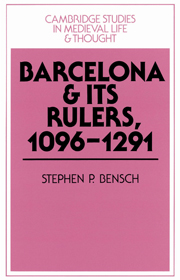Book contents
- Frontmatter
- Contents
- List of figures
- List of maps
- List of tables
- Preface
- List of abbreviations
- Introduction
- 1 The city and its region
- 2 The city and its lord
- 3 An aborted take-off: the urban economy in crisis, 1090–1140
- 4 Urban society in transition
- 5 The patriciate in gestation, 1140–1220
- 6 Family structure and the devolution of property
- 7 Consolidation and conflict: patrician power and Mediterranean expansion, 1220–1291
- 8 Patrician continuity and family identity
- Conclusion
- Appendix 1 Vicars of Barcelona
- Appendix 2 Bailiffs of Barcelona
- Appendix 3 Coinages and exchange values
- Appendix 4 Select documents
- Appendix 5 Select genealogies
- Bibliography
- Index
- Cambridge studies in medieval life and thought
4 - Urban society in transition
Published online by Cambridge University Press: 08 December 2009
- Frontmatter
- Contents
- List of figures
- List of maps
- List of tables
- Preface
- List of abbreviations
- Introduction
- 1 The city and its region
- 2 The city and its lord
- 3 An aborted take-off: the urban economy in crisis, 1090–1140
- 4 Urban society in transition
- 5 The patriciate in gestation, 1140–1220
- 6 Family structure and the devolution of property
- 7 Consolidation and conflict: patrician power and Mediterranean expansion, 1220–1291
- 8 Patrician continuity and family identity
- Conclusion
- Appendix 1 Vicars of Barcelona
- Appendix 2 Bailiffs of Barcelona
- Appendix 3 Coinages and exchange values
- Appendix 4 Select documents
- Appendix 5 Select genealogies
- Bibliography
- Index
- Cambridge studies in medieval life and thought
Summary
The animation of urban life after the millennium strengthened the ties of Barcelona to the fields, vineyards, orchards, and gardens surrounding it and at the same time magnified its role as the nodal point of regional society. As the finely spun threads of economic and family interest became increasingly intertwined, more tightly woven, they created complex patterns in which any sharp contrast between rural and urban concerns dissolved. Rather than tearing the traditional social fabric, the early growth of Barcelona embellished the material, making it more sumptuous and enlarging its proportions to accommodate a broader framework of interchange.
Throughout the Mediterranean ancient Roman towns frequently retained distinctive administrative, military, and religious functions during the obscure, poorly documented centuries of the early Middle Ages. As they formed dense historical spaces or, in a rather clinical term, “central places,” they attracted, concentrated, and coordinated diffuse networks of power through an intricate urban microcircuitry of social relationships. In historiographical terms, the revived towns of the medieval Mediterranean have increasingly assumed the appearance of compacted regions. Especially in recent reassessments of early urban growth in northern Italy, burghers have been stripped of much of the originality that earlier generations of historians had attributed to them. Summarizing recent tendencies in Italian urban studies, David Herlihy remarked that the city in itself can no longer be regarded as an “independent unit of analysis.” Jacques Heers, Hagen Keller, Gabriella Rossetti, and Diane Owen Hughes have insisted on placing early urban populations squarely in the cultural, familial, and institutional settings of the rural-aristocratic worlds surrounding them; the movement between expanding cities and their regions now seems so fluid as to make town walls porous.
- Type
- Chapter
- Information
- Barcelona and its Rulers, 1096–1291 , pp. 122 - 169Publisher: Cambridge University PressPrint publication year: 1995



